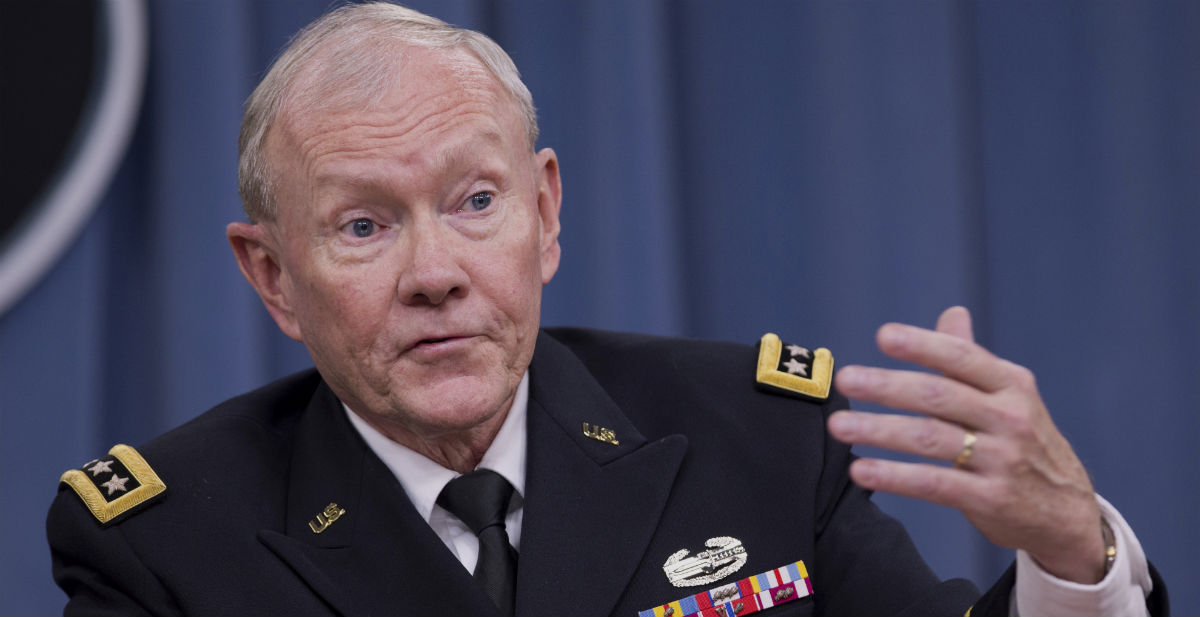The nation’s top military leader on Tuesday raised the possibility of U.S. advisers joining Iraqi troops as they target Islamic extremists amid concerns in a war-weary nation of greater American involvement after more than a decade of fighting.
Videos by Rare
Army Gen. Martin Dempsey, the chairman of the Joint Chiefs of Staff, told a Senate panel that the goal for American advisers is to help Iraqi forces with planning, logistics and coordinating military efforts by coalition partners to take out members of the Islamic State group.
“To be clear, if we reach the point where I believe our advisers should accompany Iraqi troops on attacks against specific ISIL targets, I will recommend that to the president,” Dempsey told the Senate Armed Services Committees.
Dempsey and Defense Secretary Chuck Hagel faced multiple questions from lawmakers in the first high-stakes hearing examining President Barack Obama’s expanded military campaign to counter the relentless terrorist threat from Middle East extremists.
The U.S. military conducted strikes near Baghdad against the Islamic State group, which has seized large swaths of Iraq and Syria. Obama is seeking congressional support to train and equip vetted Syrian moderates fighting both the Islamic militants and forces loyal to President Bashar Assad.
Dempsey said the United States is prepared to strike Islamic targets in Syria.
“This will not look like ‘shock and awe’ because that is not how ISIL is organized. But it will be persistent and sustainable,” Dempsey said, referring to the air bombardment at the start of the Iraq war in March 2003.
Several lawmakers have their doubts about the United States being pulled into a larger war, with increasing numbers of American troops. The president has already dispatched more than 1,000 Americans three years after combat forces left Iraq.
Anti-war protesters filled the front rows at the hearing, chanting “no more war” at the start of the session.
Hagel said the involvement will not be “an easy or brief effort. We are at war with ISIL, as we are with al-Qaida.”
President Barack Obama and Vice President Joe Biden met in the Oval Office with retired Marine Gen. John Allen, who is coordinating international efforts to combat the Islamic State militants. Brett McGurk, a top Iraq adviser at the State Department, also took part in the meeting.
Skepticism was evident on Capitol Hill.
“I support the president 1,000 percent on air support. I do not support the training of Syrian rebels,” Sen. Joe Manchin, D-W.Va., a member of the Armed Services Committee, said Monday. His reservations stemmed from the “eight years, $20 billion to train” the Iraqi forces after the U.S. invasion in March 2003. “See what the outcome was there,” he said.
Another member of the committee, Sen. John McCain, R-Ariz., questioned the administration’s resolve.
“How serious are we? We could have bombed Syria yesterday. We could have taken out ISIS. I can point out to them targets on a map,” McCain said Monday. The Islamic State group is sometimes called ISIS or ISIL.
Racing to finish its work and leave Washington for midterm campaigning, House Republicans finalized legislation to authorize the mission to arm and train moderate Syrian rebels.
The authorization under consideration will be included as an amendment to a spending bill Congress must pass to keep the government open until mid-December. That would give lawmakers the opportunity to hold a separate debate and vote on the matter — something members of both parties want.
The House Rules Committee voted late Monday to have six hours of debate on the amendment, once it is taken up, with a vote possible as early as Wednesday.
Bowing to congressional fears that any vote is tantamount to a war vote, the legislation includes a provision stating that “nothing in this section shall be construed to constitute a specific statutory authorization for the introduction of U.S. armed forces into hostilities or into situations wherein hostilities are clearly indicated by the circumstances.”
The provision reflects a congressional divide between hawks seeking tougher action than that proposed by Obama and lawmakers weary from more than a decade of U.S. wars in Iraq and Afghanistan.
The measure compels the Pentagon to present Congress with a plan 15 days before any training begins and requires ongoing updates every 90 days.
The U.S. plan is to develop moderate Syrian forces at Saudi Arabian training sites before helping them return to the battlefield. It’s unclear how long they would need to be trained to be battle-ready or how the U.S. could ensure their attention remained on fighting extremists and not just the Syrian government.
Many Republicans and Democrats have expressed reservations about the ability to identify moderates in a country awash with rebel formations and shifting alliances. The Islamic State grew out of the al-Qaida movement, but the two are now fighting. In some instances, the moderate Free Syrian Army has teamed with al-Qaida’s local franchise, the Nusra Front.



